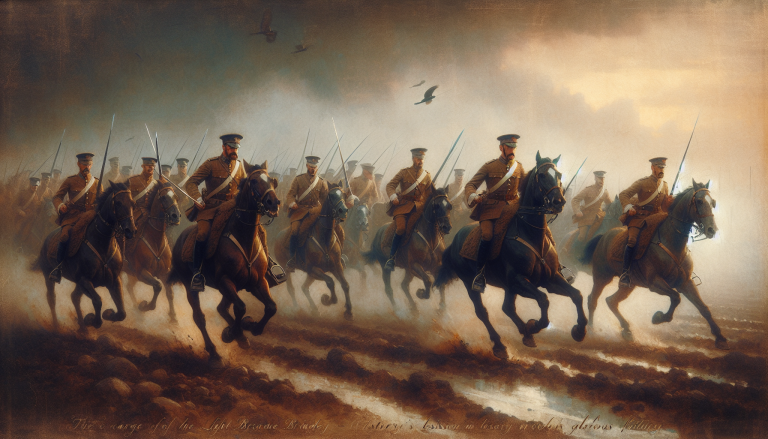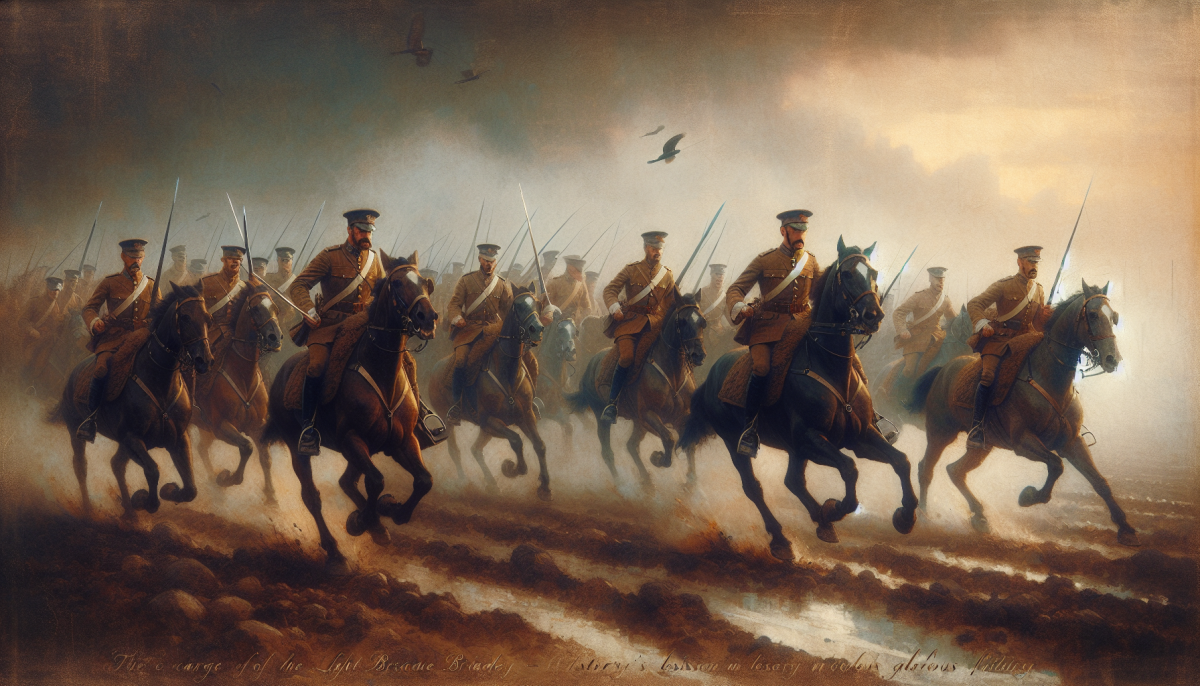The Charge of the Light Brigade: A Masterclass in Futile Blundering
When history invites you to witness the gold standard of futile efforts wrapped up in a flurry of pomp and miscommunication, it doesn’t just call—it screams, “Behold the Charge of the Light Brigade!” This legendary tale from the Crimean War (1853-1856) isn’t just a military debacle; it is the original poster child for the phrase “beating a dead horse.” If futile were a sport, the Light Brigade would have taken home the gold, silver, and bronze, all while gallantly riding into oblivion.
Picture this: British cavalry, one of the fastest horses in the Empire, getting a mission that might as well have been delivered via 19th-century game of Telephone. The order was famously vague, shouted in the fog of war, and landed somewhere between “Attack the enemy’s artillery” and “Run wildly into certain doom because someone didn’t check their map.” The result? The aristocratic compatriots of the Light Brigade charged straight into a Russian artillery battery, which was well-prepared, not pleased, and enthusiastic about shooting at perfectly mounted targets.
Futile: When Orders and Common Sense Don’t Meet

It is often said that war is a series of catastrophes sandwiched between brief moments of brilliant incompetence. The Charge is no exception. Lord Raglan, commander of British forces, intended for the cavalry to prevent the Russians from removing captured guns on the battlefield. However, the communication between Raglan, his subordinate Lord Lucan, and the impulsive Lord Cardigan, who led the charge, was less a clear chain of command and more a bar stool game of charades.
Lucan supposedly saluted the order, nodded sagely, and dispatched his men with the confidence of a man who didn’t understand the mission—but was certainly going to get it done. Cardigan, eager to show off his Li’l Horsey, charged full speed ahead—right into a hailstorm of cannonballs and musketry. This wasn’t just a misstep; it was an over-the-top blunder that makes failing forward seem like an understatement.
The Horse Has Long Been Dead, But We’re Still Swinging
The phrase “beating a dead horse” is believed to have originated in the era when literal horse-whipping was, tragically, a thing. But if you wanted a metaphorical horse to slap upward of 600 times before it collapsed under an artillery barrage, none quite top the Light Brigade. The campaign was futile, resulting in the loss of around 110 men and hundreds of horses, a cost so grievous that it became less a daring charge and more an accidental war dance of doom.
Yet, despite the glaring evidence that they might as well have been trying to resuscitate equine remains with a paper fan, the British military command insisted on commemorating the charge. Alfred, Lord Tennyson immortalized it in verse with such poetic gravitas that generations were told the cavalrymen “rode into the valley of Death” with the unyielding spirit of, well, people beating a dead horse and making it sound downright noble.
From Poetic Tragedy to Political Farce
Was it heroic? Yes, if your idea of heroism includes ignoring every hint of practicality. Was it blunderous? Oh, decidedly. The Charge of the Light Brigade was the epitome of futile heroics, performed with the intensity of someone trying to win a debate with a parrot who only squawks “Wrong!” The British Empire’s stubborn refusal to admit this was a colossal mess created a rerun of the same mistakes, with military planners effectively “beating a dead horse” as new generations marched into similar confounding strategies.
No brilliant general ever explained why the charging cavalrymen failed to stop the enemy from taking the guns—the guns they were supposedly ordered to destroy. Instead, the episode became the go-to metaphor for everything from endless bureaucratic delays to political campaigns that stubbornly refuse to recognize when their cause is as dead as the artillery horse.
Humor and Satire Join the Fray
The absurdity of the Charge lends itself easily to satire. Cartoonists from Punch magazine (the Victorian era’s answer to the internet meme) gleefully lampooned the event. One famous illustration showed cavalrymen charging toward sentry birds instead of Russian guns. The caricatures were less about mockery and more about pointing out the dire need for better communication—because nothing says “military excellence” like getting slaughtered by your own misunderstanding.
Fast-forward a century and politicians, commentators, and comedians alike began referencing the Charge when describing any stubbornly repeated yet obviously doomed endeavor. Whether it’s an endless political campaign clinging to a lost cause or a company pushing a product no one wants, the phrase “beating a dead horse” entered the cultural lexicon as shorthand for exhausting anyone’s patience with a hopeless effort.
One memorable quip comes from Winston Churchill, who, while campaigning, is said to have lamented futile political endeavors by hinting that sometimes even the fiercest horse can’t be made to gallop no matter how hard you beat the metaphorical carcass.
Lessons from the Horses’ Mouth
There’s a lesson here that even history’s most tragic blunders have a place in our laughter-filled storytelling archives. The Light Brigade’s charge is a perfect cautionary tale about the perils of miscommunication and blind obedience. And yet, it also reminds us just how human even our biggest setbacks are. Someone, somewhere, decided it was brilliant to send cavalry into artillery fire. Someone else happily hitched their wagon to that idea, right into cannon fire.
Perhaps the most futile act of all was the post-charge determination not to learn from the error. But then again, history books—and humorists—would be far less entertaining without these spectacular incidents of “beating a dead horse.” Because nothing quite beats the image of fleet-footed men in splendid uniforms charging gallantly where everyone with a brain cell or a decent map knew the horse was already long dead.
So next time you find yourself pleading with your boss, your in-laws, or a Wi-Fi router that refuses to connect, just channel the Light Brigade and remember: Sometimes, charging headlong into disaster is the only way to make history. And sometimes, it’s just plain funny.
